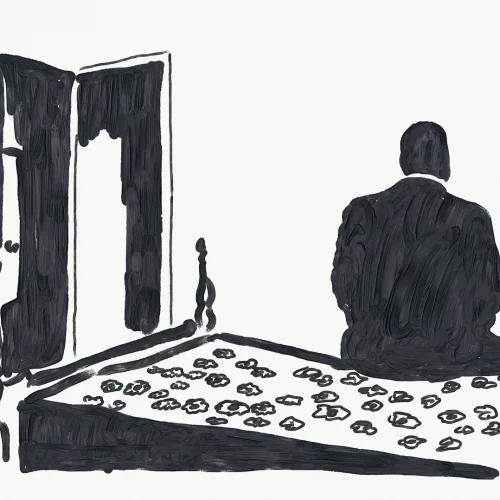If I had to say why Norwegian Wood by The Beatles is a great song, I couldn't name one single reason. There are many and very different among them: it is musically, it is for the words, it is for what it evokes.
The Music
The form of the song is historically born from the setting of words to music. They could have been poetry, a tune, a story. There are traces of them since the Middle Ages, even if the origin is traced back to the Romans or even the Egyptians. Isolating the elements therefore, a song is defined by words and music.
Norwegian Wood is musically interesting because the melody is played with a sitar, not a guitar or a normal Western instrument. But it speaks of something that is defined geographically by its title: it speaks of Norwegian Wood.
The fact that the music is structured on such a powerful cultural dislocation stimulates a dissociative mental mechanism: we are in London or maybe in Oslo, but the echo of the melody takes us elsewhere, thousands of miles away. I love things that challenge me. I love even more the things that pose them in a kind way: the melody of NW is still beautiful, I don't care if it is played with the sitar.
(the fact that there is the sitar is perhaps accidental: George Harrison was learning to play it in 1965 so he probably wanted to put it there because he liked the idea, even if it had nothing to do with geography).
The Words
You can listen distractedly to NW and love its musical structure but when you pay attention to the words you understand why it's a great song: they're simple, they're intimate but they tell a story.
Every good song tells a story
And it's a very simple story about NW: he tells about him meeting a girl and going to her house. He says it from the beginning, but not in a neglected way or as if it provided a detail that just contextualizes it:
I once had a girl
Or should I say she once had me
"Once." It starts like all stories: Once. "Once upon a time I had a girl." It can be understood in the most direct way, that is "we had a relationship" or in the sense that the protagonist had met her. But immediately after this normal relationship between two human beings is reversed: "Or, perhaps I should say, she had me". The protagonist, or rather who exercises some form of power in this story, is the girl, not the storyteller, who however recognizes that in this relationship it is she who decides, not him. From the beginning: exposition of a relationship, immediate contradiction=point of view suddenly changed. The listener thinks he has understood how things are, but immediately afterwards he is told that no, things are not really like that.
NW is the narration of a continuous series of unpredictable events, even within a story with a very simple structure.
Not much else happens, apparently.
She showed me her room
Isn’t it good Norwegian wood?
She shows him her room and of this she says only one thing, one detail: "Isn't it good/solid/beautiful? It's made of Norwegian wood", implying that it has to be good and he has to like it, because it's very good quality wood.
He nods - it's not known - and she tells him to stay with her and sit wherever he wants. And he now notices a detail: there are no chairs in that room. So he sits on the carpet and drinks wine.
She asked me to stay
And she told me to sit anywhere
So I looked around
And I noticed there wasn’t a chair
I sat on the rug biding my time
Drinking her wine
What has happened so far in a very short time (first time: get to know each other/go to her house/exchange a few words about the room/sitting down to drink wine) is extended for hours (second time):
We talked until two and then she said
“It’s time for bed”
She told me she worked
In the morning and started to laugh
I told her I didn’t
And crawled off to sleep in the bath
"We talked until 2:00 a.m. and then she said, 'Time for bed'" because she had to work the next day. He is now a subject made totally passive either by the desire to have her (the sexual subtext is never explicit but you can see it) or by the wine. Only 'I don't' answers, in the sense that he doesn't have to work.
But just as there are no chairs, there isn't even a bed big enough to fit both or anyway she is not going to share hers with him and so she tells him to sit in the bathroom, where he falls asleep, presumably drunk, perhaps in the bathtub.
The next morning (third time) he wakes up and discovers he is alone.
The little bird was gone." What tenderness in these words: the girl like a little bird. But at the end comes the real punch line, which, once again, completely overturns the point of view and completely disorientates:
So I lit a fire
Isn’t it good Norwegian wood?
Left alone, presumably in the cold, after making him think that they could have made out for an entire evening, without even giving him a chair to sit in, and after sending him to bed like a mother or a superior of a Swiss boarding school, our singer regains the status of protagonist:
I lit the fire
It was a good Norwegian wood after all, wasn't it?
A potential love story that one could become passionate about by identification becomes the story of frustration and final revenge. All in just over 2 minutes. Genius. Genius also because it not only tells a story, but for the intrinsic quality of this story that, in its simplicity and familiarity, is made up of continuous changes of point of view, changes of perception and small twists. Until the end: it's not a love story but a story of revenge, even if it's very British: ah, is it good Norwegian wood? Yes, it actually burns very well.
The Evocative Power
People like stories because they can identify in them. Most of the songs you hear today tell nothing or exalt an ideal love through the qualities of the beloved. Exaltation to which I react in an increasingly bored manner. I don't care that yours is a beautiful and perfect love dear singer: love and perfection are boring and very personal, therefore doubly boring. Your story, on the other hand, can be interesting, as long as you have it and know how to tell it. Then I'll listen to you. Your words must have a quality and above all a literary structure. If then your story is able to make me believe one thing and completely change the cards on the table as in NW, then you are at a higher level, the one that comedians draw from, but only the best ones: the ability to serve punch lines that come from where you don't expect them, they will surprise you and make you smile. Or at least they put you in a condition of instability and therefore of movement: you have to interpret, you have to understand. Like the sitar in a western song. Like the Norwegian wood in a song of (apparent) love. Why the sitar? Why the Norwegian wood?
Music is literature
Speaking of the literary quality of a musical text, one of my favorite examples is the first verse of "Oh, What a World" by Rufus Weinwright. It's the height of minimalism and the height of evocative power, in one line!
Men reading fashion magazines
Can you say more with less? I don't think so, at least not in less than four words. Men who read women's magazines. Is that all? That's all, but think what it evokes: once again, a disorientation. If those men had read magazines the verse would only have provided a contextual element: in the scene there are men reading, end. But these men read women's magazines. And they are men. Why? What's happening now?
If every word of a lyric or song questions you about what will happen next, that lyric tells a story and I want to know it.




